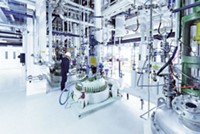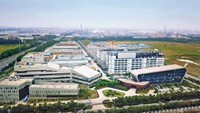Advertisement
Grab your lab coat. Let's get started
Welcome!
Welcome!
Create an account below to get 6 C&EN articles per month, receive newsletters and more - all free.
It seems this is your first time logging in online. Please enter the following information to continue.
As an ACS member you automatically get access to this site. All we need is few more details to create your reading experience.
Not you? Sign in with a different account.
Not you? Sign in with a different account.
ERROR 1
ERROR 1
ERROR 2
ERROR 2
ERROR 2
ERROR 2
ERROR 2
Password and Confirm password must match.
If you have an ACS member number, please enter it here so we can link this account to your membership. (optional)
ERROR 2
ACS values your privacy. By submitting your information, you are gaining access to C&EN and subscribing to our weekly newsletter. We use the information you provide to make your reading experience better, and we will never sell your data to third party members.
Business
Running out of capacity at WuXi’s manufacturing arm
Small-molecule drug chemical subsidiary of WuXi AppTec advances its vast expansion program
by Jean-François Tremblay
August 29, 2016
| A version of this story appeared in
Volume 94, Issue 34

When companies announce vast expansions of their production capacity, their competitors don’t necessarily worry too much, because it might be just talk. But in the case of Shanghai SynTheAll Pharmaceutical (STA), the small-molecule manufacturing subsidiary of the contract research firm WuXi AppTec, it appears to be more than just talk. The company is far along in building three large-scale manufacturing units in Changzhou, China, at a site where it might eventually run a total of nine large plants.
The expansion makes sense, STA says, because its older and smaller site in Shanghai is already operating at full capacity. In the coming years, the firm’s president says, much more additional capacity will be required to serve STA’s current portfolio of customers.
In contrast with the fragile overall economic conditions prevailing worldwide, the custom pharmaceutical manufacturing sector is in a vibrant state of health. A number of prominent firms are currently investing in plant expansions to help them serve their existing customers. But STA stands out for the large scale of its program.
“We have had to turn down some business,” says Minzhang Chen, STA’s chief executive, to explain why the firm is so rapidly building the three manufacturing units in Changzhou. “And many of the programs we’re working on are entering the process validation stage,” he says, referring to the testing of the method that will be used to produce a new drug commercially.
STA is currently spending $140 million at its 37-acre plot in Changzhou. This first phase of investment includes the three plants, infrastructure such as large tanks containing liquid raw materials and a process development center, and support facilities such as offices and a canteen. Earlier this year, STA completed the construction of the first unit as well as the infrastructure and support facilities. Work is well under way on the second and third manufacturing units, which are scheduled to come on-line at the end of this year and the middle of 2017, respectively.
The customer programs STA is working on vary widely in scale, ranging from orphan drugs that will be manufactured in small reactors to potential blockbuster drugs that will be made in much larger volumes. The facilities under construction in Changzhou are designed to cope with this wide range of manufacturing scales, Chen says.
Although its expansion program stands out for its magnitude, STA is just one of many custom manufacturers that are investing in their facilities. Portugal’s Hovione, for example, will spend $100 million throughout the next two to three years in capacity expansion. Luis Gomes, the firm’s vice president of manufacturing, says the market is expanding because of an innovation boom in the biotech sector.
At the same time, the custom manufacturing industry consolidated during the lean years of the 2000s, leaving a smaller number of what Gomes calls “trusted addresses” for drug industry customers to call on.
In South Korea, SK Biotek is spending $70 million on a second plant that could double the company’s sales after it comes on-line. The custom pharmaceutical market is a growing one because drug firms are outsourcing more and more, explains Jaeyon Yoon, the firm’s chief marketing officer. But, he adds, growth is uneven among companies.
“The growth is more like a shift in business toward the highly qualified suppliers,” he says. “Good companies need more capacity, but less qualified ones experience overcapacity.” Many customers, he notes, are paying more attention to data integrity issues after several Indian drug manufacturers failed U.S. and European regulatory inspections in recent years.
Business is flocking to companies that are free of regulatory issues and can offer a wide range of options to their customers, says Ramesh Subramanian, vice president of marketing at the Indian custom manufacturer Piramal Pharma Solutions. To increase its appeal to North American customers and expand its capabilities, Piramal earlier this month agreed to pay $50 million to buy Ash Stevens, a Michigan-based manufacturer of high-potency active pharmaceutical ingredients.
The contract manufacturers most likely to attract business are the ones that have a good regulatory compliance record, a strong balance sheet, and a strong customer focus, Subramanian notes. “Those companies will continue to do well,” he says.
One of the shortcomings of STA’s new Changzhou facilities is that they have not yet been inspected by the U.S. Food & Drug Administration or other regulators. Chen says he is not concerned, noting that the company’s Shanghai plant passed three FDA inspections with flying colors in the past three years. The main concern now, he says, is getting Changzhou up and running as soon as possible.
Hovione’s Gomes agrees that the contract manufacturing sector’s top companies—the trusted addresses—need to grow quickly to meet pharmaceutical industry demand. Chen seems confident that Changzhou will be added to that address book soon.





Join the conversation
Contact the reporter
Submit a Letter to the Editor for publication
Engage with us on Twitter